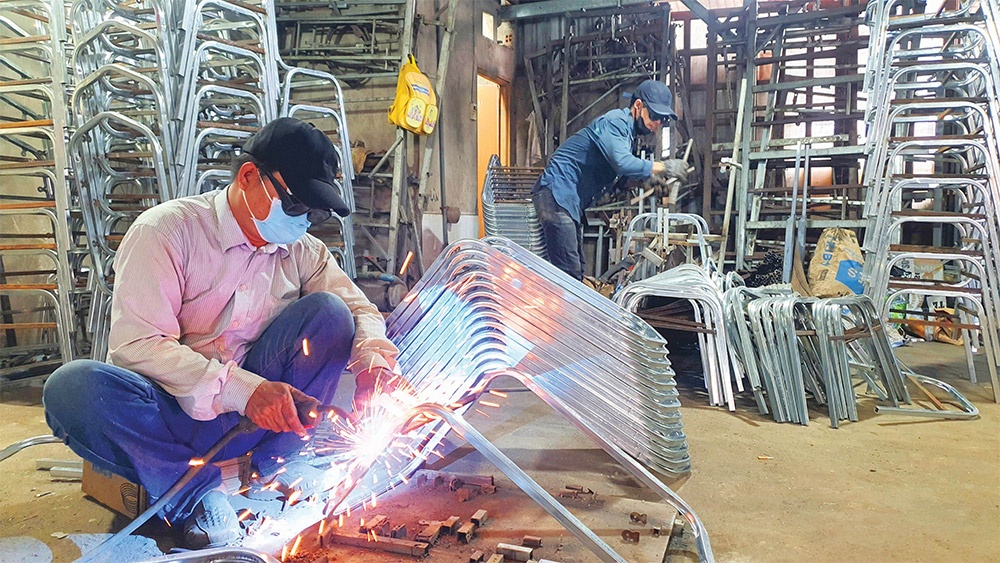Support adjusted for effectiveness
The Supervision Team of the National Assembly (STNA) last week told the legislature that the hallmark Programme on Socioeconomic Recovery and Development (PSRD) for 2022-2023 was carried out at a very slow pace, affecting the country’s socioeconomic recovery and enterprises’ performance.
 |
| Some companies have found it difficult to access certain types of loans, photo Le Toan |
“It is strongly recommended that the government soon direct ministries, sectors, and localities to review the PSRD thoroughly, and apply new sturdy solutions to remove all difficulties so that the allocated capital from the programme will continue to be disbursed so that more projects can be put into use,” the STNA stated. “Efforts are to be made to complete all disbursements by December 31.”
If the disbursement cannot be completed at the end of this year, responsibility of all relevant agencies, investors, and projects’ managing units must be clarified, and the team will ask the NA in October or November to consider the prolonged implementation of the PSRD until 2025, so that there will be no half-done or ineffective projects, the STNA said.
At the start of 2022, the NA adopted Resolution No.43/2022/QH15 on fiscal and monetary policies to support the PSRD with an estimated value of $15 billion.
The PSRD, designed by the Ministry of Planning and Investment, was expected on a macro-view to drive the economy to a higher level of growth – at 6.5-7 per cent for the 2021-2025 period.
Within two years of implementation, many targets set out in Resolution 43 were almost completed. The economy grew 8.12 per cent in 2022, the highest level during the 2011-2022 period, and reached 5.05 per cent in 2023, deemed a relatively strong result given the global complexities faced that year.
The government is expecting the economy to grow 6-6.5 per cent this year.
“The macroeconomic stability has been maintained, with all balances of the economy ensured. The monetary and fiscal policies have been combined harmoniously,” said Le Quang Manh, Chairman of the National Assembly Budgetary and Finance Committee, and vice chairman of the STNA.
“Inflation has been controlled, while a large volume of public investment capital has been poured into the economy. The 2022-2023 socioeconomic development results have laid an important foundation for the country to continue successfully accomplishing all socioeconomic goals set by the National Party Congress for the 2021-2025 period,” Manh added.
Nevertheless, the STNA pointed out that many policies in the PRSD have failed to reach the set plan. For example, the 2 per cent lending rate support package, worth $1.66 billion and disbursed via the commercial bank system for businesses, cooperatives, and household businesses, saw a very low disbursement rate of only 3.05 per cent, or $50.6 million. This initiative ended late last year.
“The main reasons behind the slow disbursement of this support package is that customers were afraid of inspections and examinations. Besides that, to obtain loans from this package, beneficiaries must demonstrate their ‘recovery ability’ as a tough condition,” said a government report sent to the NA on the implementation.
“Moreover, many customers had no demand for this type of loan, as they had already benefited from preferential lending rates offered by the banks’ own loaning schemes. Furthermore, many households do not register as business and production households, so they were unable to benefit from the package.”
According to the STNA, the initiative to provide preferential house rental for labourers has also been implemented slowly, with disbursement reaching only 56 per cent by late 2023 before it was also ended. Other initiatives such as a fund for telecommunications services and a fund for supporting tourism development support have also failed to be implemented effectively, with no capital disbursed due to complicated procedures and no demand from borrowers.
Commenting on the 2 per cent lending rate support package, Nguyen Thi Hong, Governor of the State Bank of Vietnam, acknowledged that the outcome was not good enough.
“This package was part of the PSRD, exclusively aiming to support enterprises with a recovery ability, meaning those who can pay debts. It was not a policy to help solve capital difficulties for all struggling enterprises in the economy, including those that could not meet loaning conditions,” Hong explained.
“It was because the package’s capital came from credit institutions’ capital mobilised from the public, and only 2 per cent lending rate support was from the state budget. That’s why the credit institutions still had to provide preferential loans under the law, and they must ensure an ability to take back debts. Thus, the disbursement volume would largely depend on the decisions of enterprises and credit institutions,” Hong added.
| Duong Van Phuoc, NA deputy, Quang Nam province
There has been a paradox that while the banking system has much money in excess, credit growth remains low due to limited demands and capital absorbability in the economy. Besides that, a number of policies have failed to specify beneficiaries. Many enterprises and individuals are entitled to preferential loans, but they have failed to obtain the loans. In addition, commercial banks’ trust in the market is low, making it difficult for expanding credits in the market. This explains why credit programmes under the PSRD and Resolution 43, as well as other initiatives on the monetary policy, have failed to meet desired expectations. Meanwhile, in the context that the economy has and will continue facing massive difficulties, the fiscal and monetary policies must continue making great contributions to supporting enterprises to get out of difficulties and recover. It is strongly recommended that the NA and the government continue to design new policies to continue supporting socioeconomic recovery and development in order to unleash resources to facilitate investment, production, and business activities. Delayed projects must receive more capital so that they can soon be put into operations. Nguyen Van Than, NA deputy, Thai Binh province
While the State Bank of Vietnam have asked commercial banks to provide preferential loans for enterprises and individuals, but banks and businesses themselves do not want that as they were afraid of inspections and examinations. But such inspections and examinations are just among one reason. Another reason lies in what many NA deputies have talked about, which is responsibility. Banks are afraid of bearing responsibility in providing loans. Why do they are afraid of bearing responsibility? Is it due to the regulations being too strict? Previously banks were not so afraid of responsibility. But now the situation is getting bigger and bigger. The NA and the government must mull over new ways so that banks can be less afraid of responsibility. This will make credits to go more into the market, and the quality of credit growth can be improved. Vu Tuan Anh, NA deputy, Phu Tho province
The 2 per cent lending rate support package has been a significant solution which could help reduce selling prices of products, and provide direct support for production and business activities, making big contributions to socioeconomic recovery and development. However, its results were very limited, meaning clearly that it became almost impractical and infeasible, greatly affecting the implementation of the PSRD. In addition, regulations to materialise the package have been unclear and unsuitable. Banks required borrowers to have an ability in debt payment and in recovery as per the assessments of the banks. Instructions for implementing the package were very slow and insufficient. This made it very hard and even impossible for borrowers to meet such strict conditions. Many enterprises were also afraid that after they obtained such preferential loans, they might face inspections and auditing from authorised agencies. Thus, even though they could meet such conditions, they did want to seek such loans. I believe that enterprises really want to get the preferential loans, but they did dare to ask for loans due to these impediments. It is recommended that the government review all policies like that before designing and implementing similar policies. |
 | Government commits to wide support towards 2025 The government will continue to expand the fiscal policy in a bid to assist those struggling and to achieve the desired economic growth target for the year. |
 | Visa supports female and youth-led businesses in Southeast Asia A report by the Organisation for Economic Co-operation and Development found that rural communities, women, and certain ethnic minority groups face barriers to realising the full uptake of digital options. Many frequently encounter growth hurdles due to cultural and institutional obstacles, coupled with a preference for informal financing. |
 | Assurances made from EU to support Vietnam’s renewables The European Union has pledged to continue providing more support for Vietnam in developing renewable energy and achieving its net-zero emissions as internationally committed. |
What the stars mean:
★ Poor ★ ★ Promising ★★★ Good ★★★★ Very good ★★★★★ Exceptional
Related Contents
Latest News
More News
- State corporations poised to drive 2026 growth (February 03, 2026 | 13:58)
- Why high-tech talent will define Vietnam’s growth (February 02, 2026 | 10:47)
- FMCG resilience amid varying storms (February 02, 2026 | 10:00)
- Customs reforms strengthen business confidence, support trade growth (February 01, 2026 | 08:20)
- Vietnam and US to launch sixth trade negotiation round (January 30, 2026 | 15:19)
- Digital publishing emerges as key growth driver in Vietnam (January 30, 2026 | 10:59)
- EVN signs key contract for Tri An hydropower expansion (January 30, 2026 | 10:57)
- Vietnam to lead trade growth in ASEAN (January 29, 2026 | 15:08)
- Carlsberg Vietnam delivers Lunar New Year support in central region (January 28, 2026 | 17:19)
- TikTok penalised $35,000 in Vietnam for consumer protection violations (January 28, 2026 | 17:15)




 Tag:
Tag:


















 Mobile Version
Mobile Version